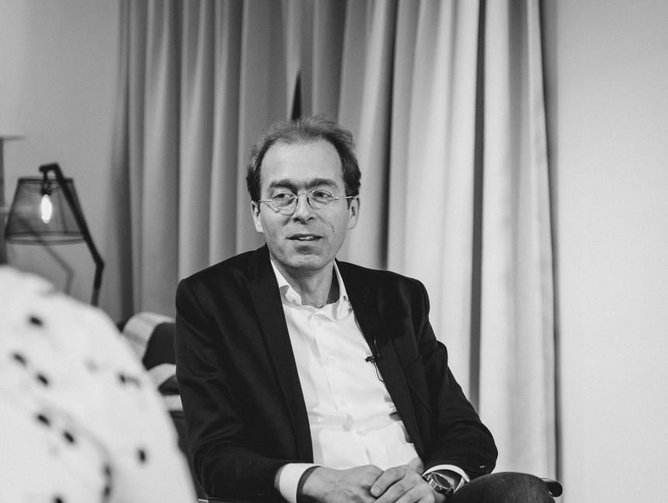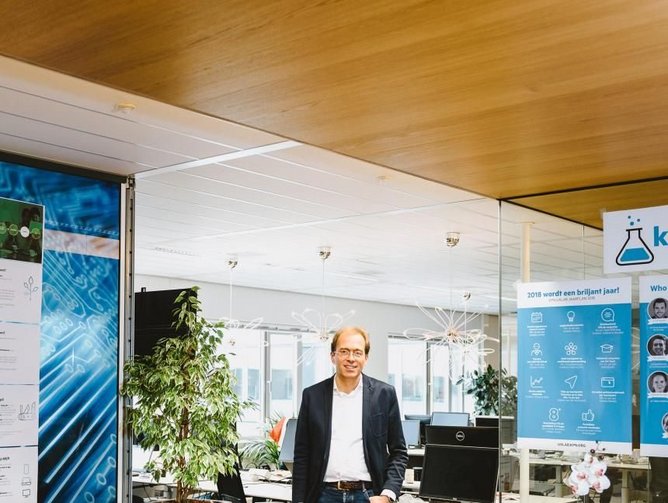KPN stands for connection. Its desire to connect its customers, engage stakeholders, and deliver a complete, omnichannel experience has seen it earn the title of the largest telecoms and IT service provider in the Netherlands.
The first telco to install 4G across the country, KPN seeks to deliver integrated, user-friendly products and services; from wireless telephony, internet, tv, mobile and fixed line, to end-to-end telecom and IT services. However, its vision to not only overhaul, but enhance the customer experience has led it to reinvent its entire business model towards the customer journey.
Moving its consumer division from The Hague to Amsterdam has better placed the business for future growth. Housing both its commercial and its technology operations under one roof, KPN will increasingly attract talent from the competitive Dutch IT technology market, in addition to driving further international recruitment.
Adaptability
Spanning up to five floors, it is clear to see that KPN continually looks to encourage innovation and creativity at every level, with ambitions to remain an essential leader within the telecommunications market.
Upon arrival, we are informed that it is undertaking its initiative, ‘Future Fit Friday’. With a keen awareness that technology will continue to be a key differentiator within its commercial propositions, every employee is asked to look at how they can keep up with new technologies which will take KPN to the next level of connectivity.
“Whilst the lifetime of technology continues to shrink, the use of new digital tools, particularly within telecoms, is becoming increasingly vital,” explains KPN’s Executive Vice President for Networks and IT, Bouke Hoving.
“With Future Fit Friday, each and every one of us are now asking ourselves the question - what do we need to develop, what we need to learn and what we need to train in to keep fit for the future.”
The winner of last year’s CIO of the Year Award, Hoving’s leadership and drive to simplify KPN’s services has been essential to maintaining its strong position in the market. His expertise and passion to deliver connected services, specifically tailored towards KPN’s customer base, is not only palpable, but considerably engaging.
He explains that in order to remain adaptable in such a competitive market, KPN will seek to infuse a number of startup culture elements within its corporate culture to drive future innovation, develop new talent and deliver exceptional services to its customers.
“The pace of technological development is unprecedented, and therefore all our staff need to pay more attention to it,” he says.
“The fact that we operate in such a competitive market with, for example, four mobile operators, makes for a nice combination of fun, great technology and very fast developments. This combination makes KPN a very attractive and a fun place to work.
“We're hiring more staff and retraining existing staff to really instil more of an engineering culture. Engineering is becoming a more crucial part of our skills and over the last three years, we have hired 150 developers who have contributed to our whole transformation.”
Customer focus
Improving the customer experience whilst simultaneously reducing ongoing costs is an impressive feat for any business, and one in which Hoving expresses genuine pride.
Declining market shares, poor customer engagement, fragmented ways of working and a low financial performance set KPN on its remarkable simplification journey back in 2013, but this has not been without its challenges.
Utilising The Business Process Framework (eTOM) and partnering with telecommunications giant Cognizant, KPN strenuously worked to rebuild its entire IT infrastructure to move from its product-led operations to one which is increasingly consumer led.
“Cognizant has been instrumental in modernising our back-end systems. Firstly, by supporting the digital transformation of B2B, as well as in B2C, driving down costs. Secondly, the way they have made us increasingly agile has been essential in improving our time to market,” explains Hoving.
“By decoupling our front-end systems from the back-end systems, one team could focus purely on optimising the customer experience and rebuild it from scratch, whilst the other could focus on the modernisation and consolidation of the back-end,” he adds.
KPN’s partnership with Salesforce has further complemented the company’s aim to redesign the customer experience, where its technologies will support KPN’s SME customers, enabling future scalability for those who utilise its services.
“Salesforce has provided strong, standardised capabilities in delivering a seamless customer experience across our different channels and products, bringing telecommunications and IT products together into a seamless customer experience,” reflects Hoving.
“What we did with home developers in the consumer market, we did on our satellite package with Salesforce in the B2B market. We have also benefited from Salesforce’s high level of standardisation and expertise across many industries.”
Delivering over more than €500mn in savings through its simplification programme, KPN’s net promoter score has also risen significantly by 20 points in three years. It has also witnessed the stabilisation and growth of its market shares.
“Costs have come down across the board by €570mn,” notes Hoving. “We have also worked to decommission up to 25% of our IT services since the start of the programme.”
Mobile growth
With such increased demand for connectivity, mobile data was always going to be a significant area of focus for KPN.
“In Western Europe, the markets are under pressure because of Over The Top substitution and commoditisation. We still see a massive growth of mobile data traffic; also, the demand for cloud services is growing, but the question is how to capture that growth,” says Hoving.
“The growth of demand for converged quadplay has enabled us to serve the market significantly better from a competitive perspective.”
However, four different mobile MyKPN selfcare applications for KPN’s individual quadplay products with separate IT infrastructures not only created a number of silos within its operations, but also greatly affected customers.
“Customers had difficulties logging in and were mixing up their fixed username with their mobile password or vice versa,” Hoving explains. “We completely redesigned these products from a customer perspective. All our customers were automatically calling our call centres as the apps were previously not user-friendly.”
By consolidating its services and rebuilding its IT infrastructure, KPN has integrated its services and enhanced its core selfcare application, MyKPN, to house all essential digital services. From managing subscriptions to its invoicing capabilities, the application can be accessed through a number of solutions, from face ID and touch ID to the use of traditional lock systems. Simplifying and enhancing its mobile services has also provided customers with the ability to share part of their mobile bundle with family members, therefore attracting an increasingly important market.
“Since we've built it around the customer and the family, we've seen an explosion of usage, where it has gone up by a factor of eight. Calls to our call centres have also dropped by a factor of two,” says Hoving.
“Joint assignments with commercial colleagues in the organisation is therefore a big part of our success. With product simplification, we've taken 80% of the products out, harmonising all our processes across products.
“We’ve done this together with our commercial colleagues and this would not have been possible without their support. And on the external side, we've always taken the principal that any simplification should be beneficial for customers.
“If we had to combine two product types, where one had a generous bundle and one a tighter bundle, we've always given the more generous bundle.
“We’ve seen a steep increase in customer satisfaction. We are now ranked 4.5 stars on Apple iOS, whereas it used to be almost two stars less two years ago,” he continues.
“There has been tremendous change within all our IT processes, where we have designed the customer journey from a digital perspective. We are leading the way in how we set up the customer experience. Whereas we used to build our IT around individual products, we now build it around the customer experience.”
International presence
Simplifying and integrating its products has further enabled KPN to reduce its time to market from months to weeks, or from weeks to days. Nonetheless, throughout its transformation, the business has sought to drive long-term growth by building strong relationships both with its partners and stakeholders.
Partnering with Huawei has been not only instrumental to the development of KPN’s IT capabilities, particularly within its mobile solutions, but its international presence in both the B2B and B2C market, Hoving states.
“We have deployed a complete state-of-the-art BSS suite with Huawei, where we have worked to modernise our product catalogue, billing and order capturing capabilities. On that basis, we can now provide a much better customer experience and get products quickly into the market.
“This has been a very important cornerstone of the whole transformation. Starting with the consumer, but ultimately taking all of our B2B customers onto that new IT suite.”
The collaboration has also led KPN to expand its footprint and partner with international companies, such as Chinese conglomerate Tencent. Since last year, the company has offered essential WeChat branded SIM cards to Chinese tourists travelling across the EU and Australia. It has also offered its 4G services to users who wish to maintain access to Tencent’s WeChat Go service throughout their travels.
“We were competing against big European telcos which could offer further network capabilities,” comments Hoving.
“However, we had superior digital and IT capabilities, with a reduced time to market. We were the only provider who could meet the challenging requirements of Tencent. Modern IT has not only helped us create a better customer experience, but also helped us improve our time to market.”
Influential technologies
Whilst Hoving is most proud of KPN’s breakthrough in transforming the customer experience, he stresses that this has been a company wide effort, both within its B2B and B2C operations. It’s aim to launch an API Store will further enable the business to partner with Dutch B2B customers and develop relative applications on the basis of connectivity, whilst remaining aware of how new technologies will reshape the telecommunications industry.
“The next phase is about transforming the network,” adds Hoving. “I think it's a very important part of the future operating model of telcos, where we have unique assets in the edge of our network. We believe there to be huge potential in edge computing, particularly for our B2B customers. We believe there's unique value to be captured in the tech industry with mobile edge and also fixed edge.
“We are currently deploying a completely virtualised content delivery network, and it has already been decentralised. We have a lot of caches which we have decentralised to our main locations at the edge, but still in the core of our network. This really helps with enhancing the customer experience of our television product.
“We're also partnering with companies such as Netflix to help jointly improve the customer experience. Customer demand is increasingly becoming more converged. We now also see demand for a combination of telco and ICT propositions in B2B.
“In the future, we'll see an increased demand for converged customer demands, packaging telco with IT. This will make the industry even more attractive.
“There are tremendous cross company opportunities to be captured, which will enable us to take the customer experience to the next phase,” Hoving concludes.








